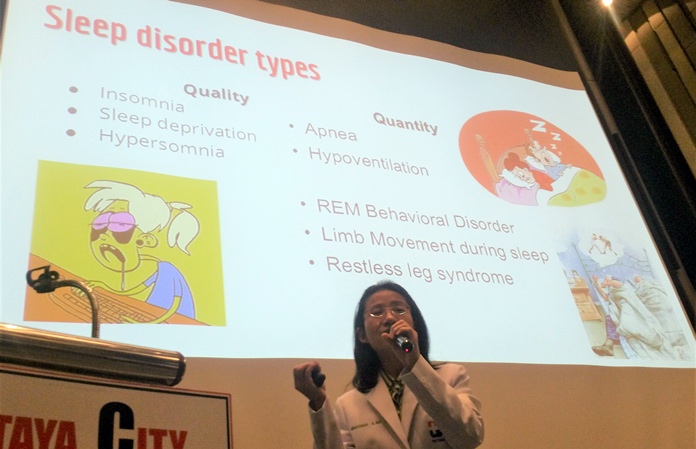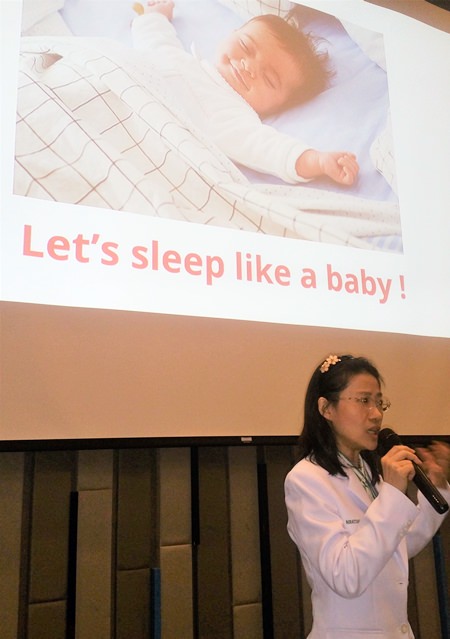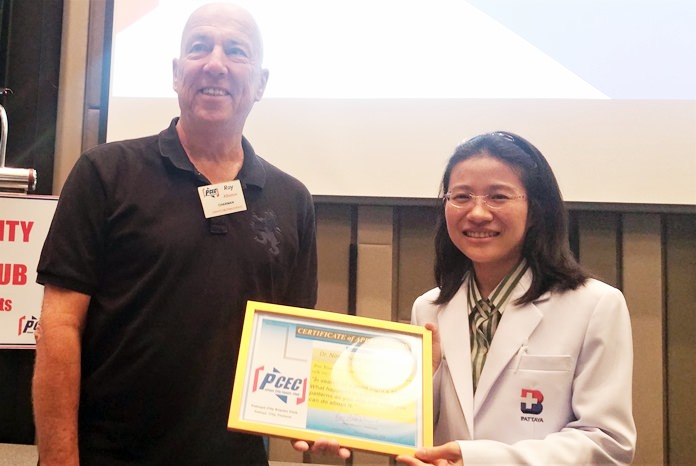
Bangkok Hospital Pattaya sent a vibrant, conversive and well-informed neurologist, Dr. Niratchada Sap-Anan, M.D., to chat to the PCEC members about a subject with high importance…sleep. The topic of her talk and power point presentation was entitled, ‘In search of a good night’s sleep.’
The first question she posed to the audience was, “How do you sleep?” This is an important concept for an aging population.
Her slide presentation layout included suggested sleep periods by age group, chemicals in the body that help with natural sleep and awakeness, a chart on sleep and circadian sleep cycles, things to avoid before sleep and sleep problems and potential solutions.
Babies and young people during development need lots of sleep, and from 12 to 18 hours is not unusual. For the majority of the population between 18 and 65 the norm lies in at around 7 to 9 hours with a normal circadian time frame of about 10 or 11 pm to about 7 to 8 am. Beyond 65, there may be a need for additional ‘nap’ times. These should not be more than 30 minutes and not be taken after 2 pm.
The doctor informed us that melatonin, a hormone to aid sleep, begins to be released by the body in late afternoon being prompted by the reduction in the daytime’s natural reduction of light and reaches its highest levels just prior to our normal bedtime late in the evening. Avoid strong light which actually awakens us. Reducing light levels in our sleeping area and avoiding mind stimulating devices like tablets and television for at least 30 to 45 minutes prior to our intended sleep time will promote a better sleep cycle. Avoiding caffeine which inhibits sleep hormones, nicotine and alcohol will also help produce a conducive sleep time. (Although it may be that alcohol may induce sleep, that sleep will have short duration and lead to early wakeups.)
Is sleep important? A chart on normal sleep cycles was overlaid with the benefits of that sleep. People generally have 3 to 4 sleep cycles per night each lasting for from 90 to 120 minutes. During the early part of these cycles the body relaxes and during the bulk of the sleep time the body repairs itself and the immune system vital to a healthy life.
The doctor highlighted several sleep problems which included insomnia (an inability to get or stay asleep), sleep deprivation and sleep apnea (a potentially dangerous waking and reawaking during the night due to air restrictions or blockage of the throat passage). Sleep apnea involves pauses in breathing during sleep. The periods of stopped breathing are called apneas, which are caused by an obstruction of the upper airway.
Apneas may be interrupted by a brief arousal that does not awaken you completely – you often do not even realize that your sleep was disturbed. It also means your brain – and the rest of the body – may not get enough oxygen. Waking up tired in the morning may be a strong symptom that one of these conditions exists. If so, the doctor recommended coming to the hospital for a check for these conditions for solutions. One diagnostic method is to measure your sleep in a sleep laboratory. Technicians would record changes in the brain waves that are characteristic of awakening.
The treatment of choice for obstructive sleep apnea is continuous positive airway pressure device (CPAP). CPAP is a mask that fits over the nose and/or mouth, and gently blows air into the airway to help keep it open during sleep. This method of treatment is highly effective. There are also several alternative sleep apnea treatment options available to those who want to avoid wearing a mask as much as possible.

REM stands for rapid eye movement. During REM sleep, your eyes move quickly in different directions. That doesn’t happen during non-REM sleep. First comes non-REM sleep, followed by a shorter period of REM sleep, and then the cycle starts over again. Dreams typically happen during REM sleep. REM behavior syndrome is a condition where the body acts out the dream. Other disorders mentioned were restless leg syndrome and limb movement.
In conclusion, Dr. Niratchada said all of us should sleep like babies if we just take a little care in our night time routines. After the presentation, the doctor answered several questions from the audience.

Dr. Niratchada Sap-Anan, M.D., is a Neurologist from Bangkok Hospital Pattaya, and she divides her time between Bangkok Hospital Bangkok and Bangkok Hospital Pattaya. She has a diploma from the Thai Board of Neurology and is certified in sleep medicine by the Cleveland Clinic, Ohio, USA and the Sleep Society of Thailand. She is also certified in the field of Epilepsy by the Royal College of Physicians of Thailand and Case Medical Center, Ohio, USA. Dr. Niratchada is also certified in Transcranial Magnetic Stimulation by the Berenso-Allen Center, Harvard Medical School, Boston, USA.
After the presentations, MC Roy Albiston brought everyone up to date on upcoming events and then turned it over to the Open Forum portion of the meeting where questions are asked and answered and comments made about Expat living in Thailand, Pattaya in particular. For more information about the PCEC and their activities, visit www.pcec.club.
 |
 |





